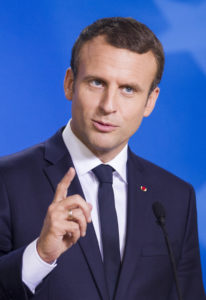By Jack Fitzgerald

United States President Donald Trump and French President Emmanuel Macron thus far have had a more stable relationship than can typically be expected in administrations where instability is the name of the game. The two leaders have been on the same page about raising their nation’s respective involvement in the Syrian conflict and both are confident beyond a shadow of a doubt that the Bashar al-Assad regime has used chemical agents on its own citizens, resulting in at least 42 Syrian deaths this past week.
Videos showing families and children frantically using a water hose in an effort to prevent further harm have gone viral as the attack has garnered worldwide attention.
A paramedic in the city spoke of treating victims who were suffocating and foaming at the mouth—telltale signs of chlorine gas exposure. The chemical weapons attack was preceded by a Syrian airstrike on the city’s largest hospital, making treatment of the victims all the more difficult for the Syrian medical staff.
In response to this, France, the United Kingdom and the United States orchestrated an attack against the Syrian government, targeting a research facility that specialized in arming missiles with chemical agents, a chemical storage facility and a bunker that the U.S. has claimed held further chemical weapon storage.
While the United Kingdom has an important role in the military alliance, the most attention has been paid to the apparently strengthening ties between Macron and Trump.
The relationship initially burgeoned when Trump first visited France near the beginning of his presidency but has now blossomed into France becoming one of Trump’s most trusted allies.
According to The Wall Street Journal, Trump expressed his hesitancy towards visiting France due to international outrage over his election, but Macron convinced Trump that he was more than welcome to come visit and take part in Bastille Day celebrations in France. Macron is also credited for convincing Trump to change his mind on skipping the World Economic Forum in Davos.
Macron’s sway with the president flows from Trump’s respect for the his ideals as well as their collective vision towards handling the Syrian Crisis . A White House official quoted in the Wall Street Journal said of leaders, “You have to look the part, and act the part for Trump. Trudeau and Macron are both good looking, and have strong visions for their country.
The president doesn’t like lukewarm; he likes charisma and vitality and strength.” But President Trump has extended correspondence with President Macron frequently compared to that of other world leaders. According to the Wall Street Journal, “U.S. officials credit Mr. Macron for investing time with Mr. Trump. He is among the most frequent callers to the White House.”
While the legitimacy of Macron’s claims of past influence can be questioned, what is undeniable is that Macron will be the first formal international visitor to the White House later this month, which seems to indicate that the presidential friendship is alive and well.
Jack Fitzgerald, FCRH ‘19, is a political science major from Brewster, New York.




































































































































































































